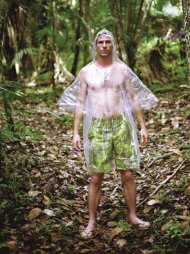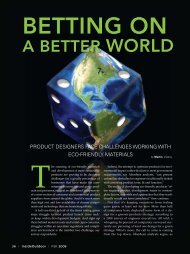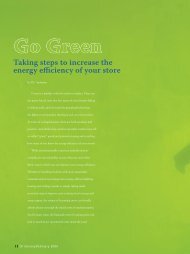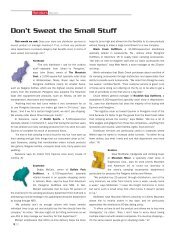Fall - InsideOutdoor Magazine
Fall - InsideOutdoor Magazine
Fall - InsideOutdoor Magazine
You also want an ePaper? Increase the reach of your titles
YUMPU automatically turns print PDFs into web optimized ePapers that Google loves.
Optimer, 180’s Settle<br />
Infringement Case<br />
Optimer Performance Fibers has settled with 180’s<br />
concerning a patent and trademark infringement upon<br />
its Dri-release with FreshGuard product. The original<br />
complaint identified work wear shirts sold online by<br />
180’s under its Gorgonz label as far back as 2005 that,<br />
although marked with the Dri-release with FreshGuard<br />
patent number, did not contain Dri-release yarn. It also<br />
identified 180’s ear warmers also not made of Drirelease<br />
that were sold bearing the Dri-release with<br />
FreshGuard logo.<br />
“Dri-release is well known in many markets as a<br />
highly effective moisture management technology<br />
brand. This action is critical to protect our patent<br />
as well as the integrity of Dri-release products sold<br />
to trusting consumers,” says Beth Moore, Optimer<br />
director of operations.<br />
Green Springs across<br />
the Supply Chain<br />
As most would expect, the recent OR Summer<br />
Market was awash in new eco-friendly offerings and<br />
sustainability stories, with news and new materials<br />
generated from up and down the supply chain.<br />
Among the bigger stories, buyers of nylon 6.6 now<br />
have a new alternative, as both Toray Industries and<br />
Unifi separately announced nylon yarns made from<br />
recycled material.<br />
Both options utilize pre-consumer nylon fiber<br />
waste, or “off-spec” yarn, that is collected during<br />
the production of traditional virgin nylon fiber and<br />
converted to the recycled nylon. While this process<br />
doesn’t take plastic bottles out of landfills, as Unifi’s<br />
Repreve recycled polyester does, Repreve Nylon<br />
conserves the equivalent of 6 million gallons of<br />
Making Virgin Nylon Versus Making Repreve<br />
Virgin Nylon 6.6 Process<br />
Crude oil wellhead<br />
Crude oil refinery<br />
Benzene<br />
Cyclohexane<br />
Hexamethylene & adipic acid<br />
Nylon salt<br />
Polymerization<br />
Extrusion<br />
Texturing<br />
Source: Unifi<br />
Repreve Nylon 6.6 Process<br />
Process eliminated<br />
Process eliminated<br />
Process eliminated<br />
Process eliminated<br />
Process eliminated<br />
Process eliminated<br />
Repreve chip production<br />
Extrusion<br />
Texturing<br />
gasoline annually compared to the production of<br />
virgin nylon or polyester, says the company. In other<br />
words, for every pound of Repreve nylon yarn, 77,000<br />
BTUs are conserved, or the equivalent of 0.6 gallons<br />
of gasoline.<br />
Meanwhile, Toray’s new ecodream requires only<br />
15 percent of the energy consumption required to<br />
produce virgin nylon, say Toray sources, while the<br />
greenhouse gas emissions are only 20 percent of<br />
virgin nylon production.<br />
Unifi has partnered with Burlington Worldwide and<br />
United Knitting in the development of new woven and<br />
knit fabrics using Repreve nylon. Burlington will feature<br />
Repreve nylon under the Generations Collection,<br />
targeting technical sportswear. United Knitting will<br />
introduce Repreve nylon in a series of new eco-friendly<br />
knit fabrics for activewear.<br />
And speaking of Unifi, Polartec has fully embraced<br />
Repreve recycled polyester for many of its offerings.<br />
The company says it will save 38 million pounds of<br />
CO2 annually by using recycled yarns, and by 2009<br />
expects 20 percent of all Polartec products to contain<br />
at least 50 percent recycled material.<br />
<strong>Fall</strong> 2008 | <strong>InsideOutdoor</strong> | 41
















